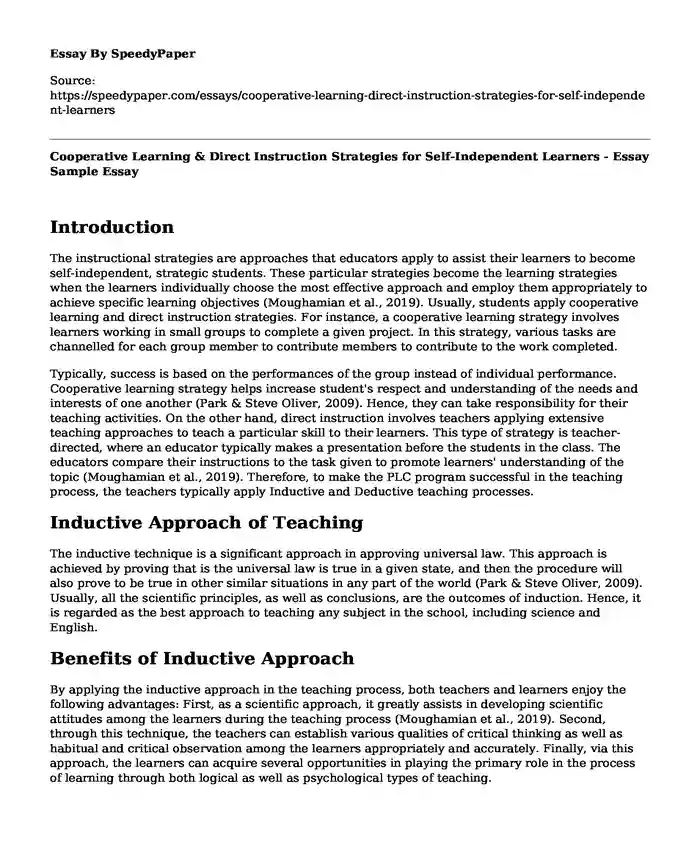
| Type of paper: | Essay |
| Categories: | Education |
| Pages: | 3 |
| Wordcount: | 768 words |
Introduction
The instructional strategies are approaches that educators apply to assist their learners to become self-independent, strategic students. These particular strategies become the learning strategies when the learners individually choose the most effective approach and employ them appropriately to achieve specific learning objectives (Moughamian et al., 2019). Usually, students apply cooperative learning and direct instruction strategies. For instance, a cooperative learning strategy involves learners working in small groups to complete a given project. In this strategy, various tasks are channelled for each group member to contribute members to contribute to the work completed.
Typically, success is based on the performances of the group instead of individual performance. Cooperative learning strategy helps increase student's respect and understanding of the needs and interests of one another (Park & Steve Oliver, 2009). Hence, they can take responsibility for their teaching activities. On the other hand, direct instruction involves teachers applying extensive teaching approaches to teach a particular skill to their learners. This type of strategy is teacher-directed, where an educator typically makes a presentation before the students in the class. The educators compare their instructions to the task given to promote learners' understanding of the topic (Moughamian et al., 2019). Therefore, to make the PLC program successful in the teaching process, the teachers typically apply Inductive and Deductive teaching processes.
Inductive Approach of Teaching
The inductive technique is a significant approach in approving universal law. This approach is achieved by proving that is the universal law is true in a given state, and then the procedure will also prove to be true in other similar situations in any part of the world (Park & Steve Oliver, 2009). Usually, all the scientific principles, as well as conclusions, are the outcomes of induction. Hence, it is regarded as the best approach to teaching any subject in the school, including science and English.
Benefits of Inductive Approach
By applying the inductive approach in the teaching process, both teachers and learners enjoy the following advantages: First, as a scientific approach, it greatly assists in developing scientific attitudes among the learners during the teaching process (Moughamian et al., 2019). Second, through this technique, the teachers can establish various qualities of critical thinking as well as habitual and critical observation among the learners appropriately and accurately. Finally, via this approach, the learners can acquire several opportunities in playing the primary role in the process of learning through both logical as well as psychological types of teaching.
Disadvantages of Inductive Approach
Unfortunately, this approach also has some drawbacks regarding its application in the teaching process: First, the outcomes or conclusions made from this particular approach are not viewed as the final results in a situation where the amount of data is substantial in number. Second, this approach is time-consuming; hence, it cannot be applied by the teacher who has little time for teaching.
Deductive Approach of Teaching
This approach is typically the opposite of the inductive approach. In this particular approach, data is obtained through the use of advanced formula or maybe experimentation method. Again, in this approach, one continues from the overall to specific principles, from the unknown to known, as well as from abstract to the most reliable facts.
Advantages of the Deductive Approach
First, this approach is appropriate when providing the developed scientific principles to the learners of lower grades or classes (Moughamian et al., 2019). Again, this technique is time-saving since learners do not need to review the universal principles compared to the inductive approach. Third, this method is non-complicated. Hence it makes teachers more comfortable and in a secure position while teaching.
Limitations of the Deductive Approach
This approach faces the following drawbacks: First, since this approach is non-conform as well as non-explanatory, it is considered an unscientific teaching approach. Through the deductive method, it becomes challenging for educators to establish a scientific outlook among the learners (Park & Steve Oliver, 2009). Finally, this approach encourages rote memory among the learners and consequently prevents them from becoming self-independent.
Conclusion
In conclusion, to realize success in the learning process, teachers are encouraged to embrace the PLC program to develop students' skills and understanding of the various subjects being taught. Through cooperative learning and direct instruction strategies, they can easily understand the learning process with the help of both inductive and deductive approaches.
References
Moughamian, A. C., Rivera, M. O., & Francis, D. J. (2019). Instructional Models and Strategies for Teaching English Language Learners. Center on Instruction. https://eric.ed.gov/?id=ED517794
Park, S., & Steve, Oliver, J. (2009). The translation of teachers' understanding of gifted students into instructional strategies for teaching science. Journal of Science Teacher Education, 20(4), 333-351. https://www.tandfonline.com/doi/abs/10.1007/s10972-009-9138-7
Cite this page
Cooperative Learning & Direct Instruction Strategies for Self-Independent Learners - Essay Sample. (2023, Aug 31). Retrieved from https://speedypaper.net/essays/cooperative-learning-direct-instruction-strategies-for-self-independent-learners
Request Removal
If you are the original author of this essay and no longer wish to have it published on the SpeedyPaper website, please click below to request its removal:
- Free Essay Sample on Inspiration for Writers
- Reflection Essay Sample on Scott Thornbury's Article Slow-Release Grammar
- Paper Sample Comprising a Psychology Learning Project Report
- Free Essay. Reflection on an Action Research
- Free Essay: Computers, Society and Ethics
- Free Essay Example - Canon and Classic
- Essay Example on Studying Journey
Popular categories




